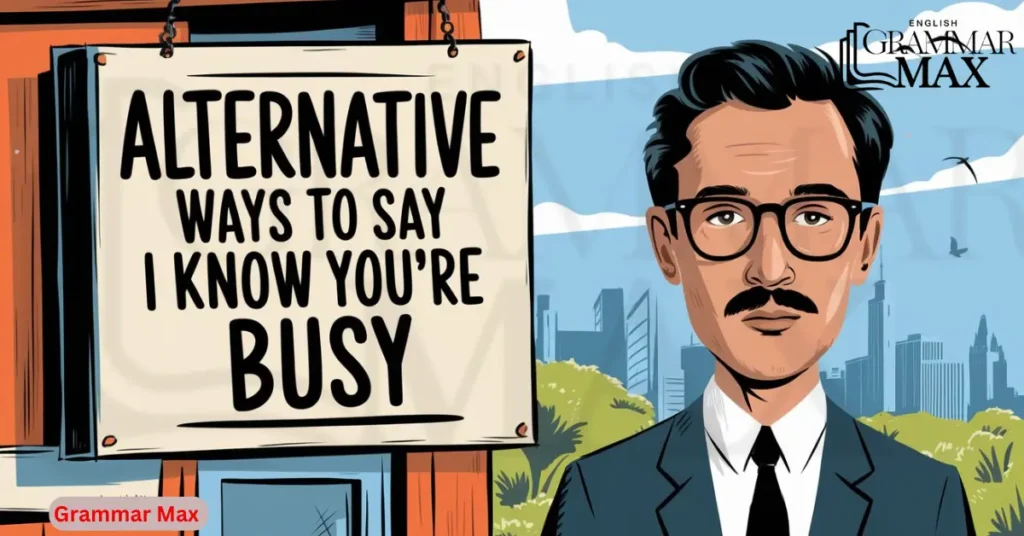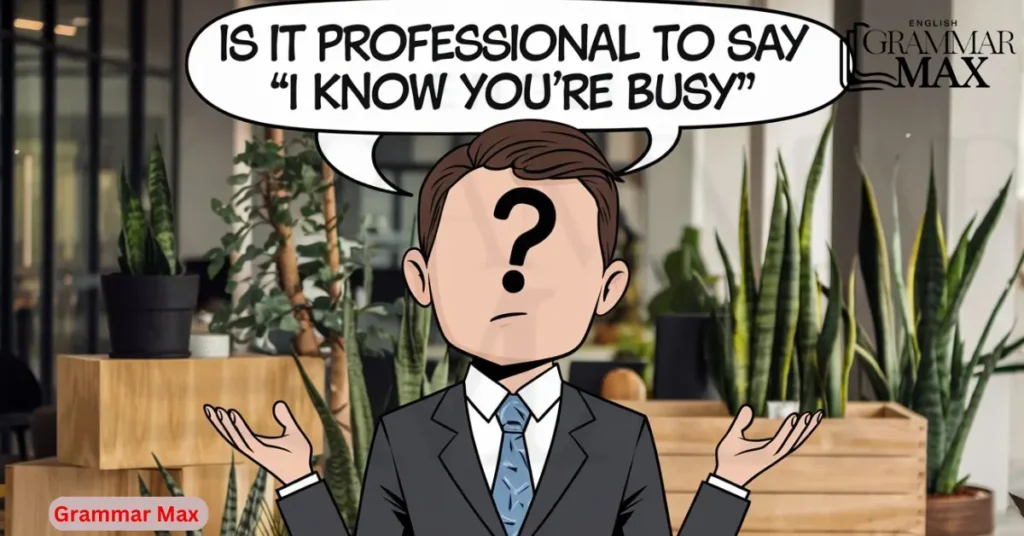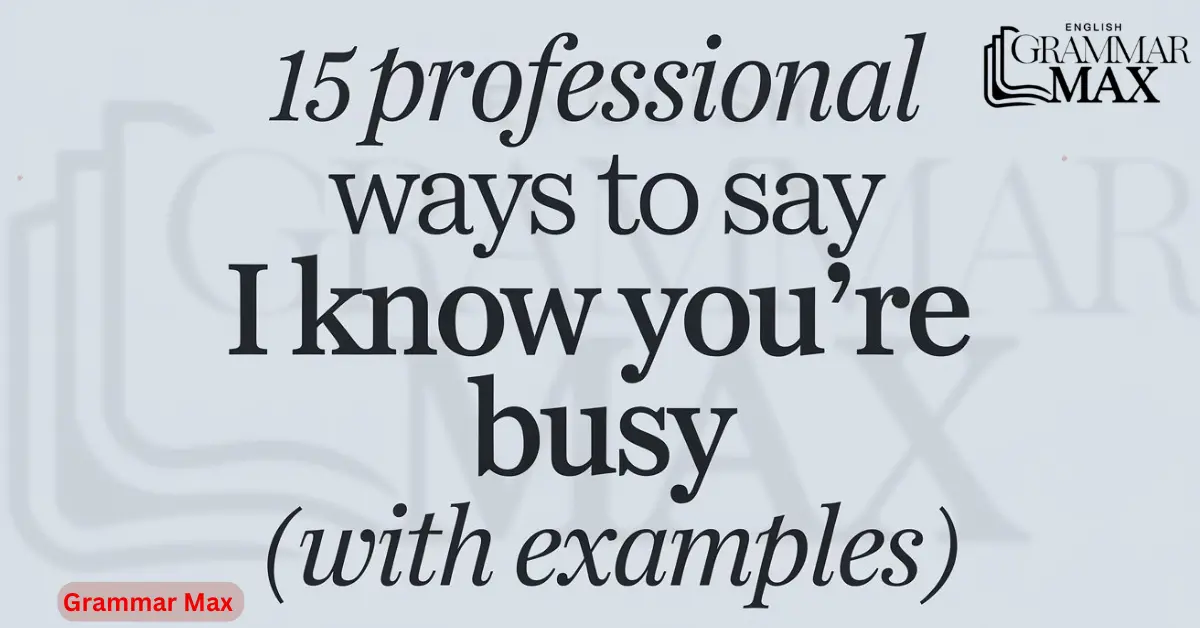“I Know You’re Busy” is a phrase we often use to show respect for others’ time, especially in professional communication. When we approach colleagues, clients, or managers, we want to acknowledge their busy schedules. However, finding the right wording is essential to keep the tone polite, professional, and empathetic.
We’ll explore 15 professional ways to express this sentiment with polished language and considerate phrasing. Each example provides alternative wording to say “I know you’re busy” while recognizing the recipient’s time and commitments. Use these expressions of empathy to navigate emails, requests, or collaborations in the workplace with professionalism and respect.
Alternative Ways to Say “I Know You’re Busy”

You can use these ways instead to say “I Know You are busy”:
- I Understand That You Have a Lot on Your Plate Right Now
- I Appreciate How Busy You Must Be
- I Know You Have a Full Schedule
- Thank You for Considering This Despite Your Busy Schedule
- If It’s Not Too Much Trouble, Could You Assist Me?
- Whenever You Have a Moment, Could We Discuss…?
- I’ll Do My Best to Be Brief
- Thank You for Taking the Time Out of Your Busy Day
- If You Find a Suitable Time, I Would Love Your Input
- Whenever It’s Convenient for You
- I Don’t Mean to Intrude on Your Schedule
- I Understand You’re Managing Multiple Responsibilities
- Please Don’t Feel Pressured; I Value Your Time
- I Realize How Packed Your Schedule Must Be
- Thank You for Your Consideration Despite Your Demands
I Understand That You Have a Lot on Your Plate Right Now
This phrase shows empathy by acknowledging the recipient’s workload and respecting their time. It subtly implies you understand they’re juggling multiple responsibilities, setting a considerate tone.
Using this phrase in professional settings can foster mutual respect by demonstrating awareness of their commitments. It’s especially useful when making a request or seeking assistance.
Example:
“Hi Jessica, I understand that you have a lot on your plate right now, but if you have a moment, I would appreciate your insights on this project. Thank you in advance for your time.”
I Appreciate How Busy You Must Be
This expression is a polite way to recognize someone’s responsibilities and convey appreciation for their time. It sets a professional tone by acknowledging their full schedule before making any requests.
Using it in an email or conversation adds a touch of gratitude, making the recipient feel valued. It’s ideal when asking for support or feedback in professional communication.
Example:
“Dear Mr. Lee, I appreciate how busy you must be and want to thank you for taking the time to read through my request. Please let me know if there’s a convenient time for us to connect.”
I Know You Have a Full Schedule
This phrase indicates you’re aware of their time constraints and want to be respectful. By acknowledging their busy schedule, you show empathy and professionalism in your communication.
It’s helpful for requests that require minimal commitment from the recipient, as it implies you don’t want to overburden them. Use it to foster respectful, polished interactions.
Example:
“Hello Sarah, I know you have a full schedule, but I wanted to reach out regarding a potential collaboration. Please let me know if you’d be open to discussing this when convenient.”
Thank You for Considering This Despite Your Busy Schedule
This statement expresses gratitude while recognizing the recipient’s workload. It shows respect and is especially suitable when asking for feedback or assistance.
By acknowledging their busy schedule, you demonstrate appreciation for their time and commitment. It’s an effective way to maintain politeness in professional emails and communications.
Example:
“Dear Dr. Thompson, Thank you for considering this despite your busy schedule. I understand the demands on your time and appreciate any insights you can provide.”
If It’s Not Too Much Trouble, Could You Assist Me?
This phrase conveys politeness and respect when seeking assistance, making it ideal for busy professionals. It shows you value their time and only ask if they can truly spare a moment.
Using this expression keeps the tone considerate and professional, especially in a formal request. It also provides the recipient with the option to help without pressure.
Example:
“Hello Patrick, If it’s not too much trouble, could you assist me with some guidance on this project? I appreciate your time and expertise.”
Whenever You Have a Moment, Could We Discuss…
This expression is flexible and polite, allowing the recipient to choose a convenient time to respond. It shows you’re mindful of their busy schedule while seeking their input or advice.
It’s especially effective when scheduling a meeting or discussion. This phrase combines empathy with respect for their availability, fostering a cooperative tone.
Example:
“Hi Amanda, Whenever you have a moment, could we discuss some ideas I have for the project? I value your insights and understand your time is limited.”
I’ll Do My Best to Be Brief
This phrase reassures the recipient that you respect their limited time and won’t take long. It’s ideal for quick requests or meetings, helping the conversation stay focused and efficient.
Using it demonstrates consideration and helps build trust by showing that you’ll be concise. This makes it particularly effective in professional emails or conversations.
Example:
“Dear Mr. Chen, I’ll do my best to be brief. I just have a few questions regarding the proposal. I appreciate your time and attention.”
Is it Professional to Say “I Know You’re Busy”?

“I Know You’re Busy” can be professional if used thoughtfully, as it acknowledges the recipient’s time constraints and shows empathy for their workload. This phrase can build mutual respect in professional communication by demonstrating awareness of priorities. However, it can sometimes come off as dismissive or overly presumptive, particularly if it feels like an empty courtesy. Using alternative phrases can help maintain professionalism while keeping the tone respectful, considerate, and appropriately formal.
Pros:
- Shows Empathy: Acknowledging someone’s busy schedule demonstrates emotional intelligence and understanding.
- Respects Time: It conveys that you value the recipient’s time and are not making excessive demands.
Cons:
- May Feel Insincere: If overused or said without genuine concern, it can come across as a formality rather than genuine empathy.
- Risks Sounding Overly Familiar: In formal settings, it may seem presumptive, especially if there isn’t a close relationship.
Frequently Asked Questions
How do you politely say you are busy?
You can say, “I’m currently managing multiple priorities but would be happy to discuss at a later time.” This politely conveys your busy schedule without sounding dismissive.
How do I ask someone who is busy?
To approach someone busy, say, “When you have a moment, could we discuss…?” This shows respect for their schedule while gently requesting their attention.
How do I say I know you’re busy in an email?
In an email, try “I understand that you’re managing a full schedule” to show empathy and acknowledge the recipient’s commitments professionally.
What to say when someone is busy?
When someone is busy, you can say, “I appreciate your time and can follow up at a more convenient moment” to let them know you respect their availability. You can also ask I know you’re busy.
Conclusion
Recognizing and acknowledging time constraints is key to building effective relationships. By using these alternative phrases, you show respect for the recipient’s commitments and convey a polished, professional tone. Thoughtful communication like this enhances collaboration and fosters mutual understanding.
Each phrase provides a refined approach to saying “I know you’re busy” in a way that’s both empathetic and professional. Integrating these expressions of understanding into your business communications not only demonstrates consideration but also reinforces the importance of valuing others’ time in any professional correspondence.

William Henry is a writer for Grammar Max, a blog that focuses on synonyms and phrases. He loves exploring the quirks of the English language and enjoys helping readers improve their vocabulary. William’s articles are easy to read, fun, and full of useful tips for anyone looking to better understand and use English. Whether you’re a student, a professional, or just someone interested in language, William’s writing on Grammar Max makes learning about words and their meanings simple and enjoyable.
